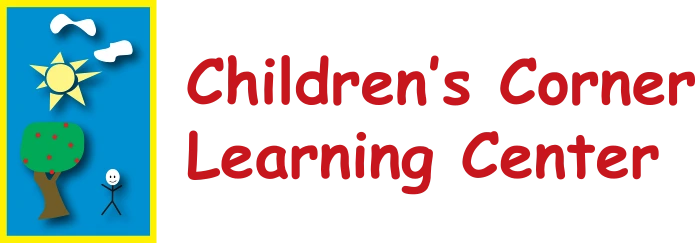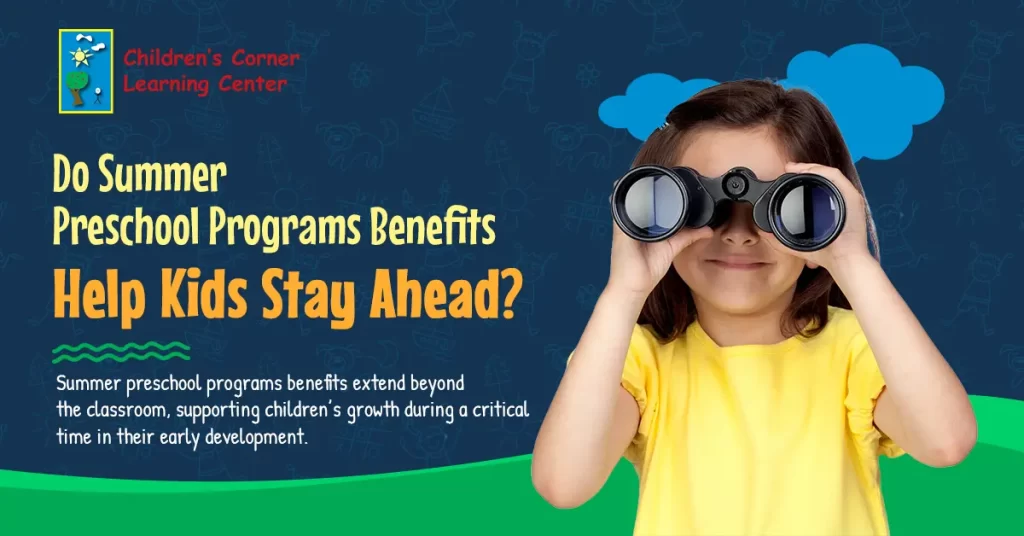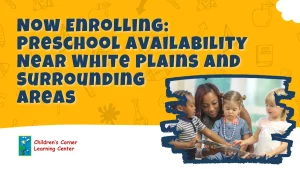Summer preschool programs benefits extend beyond the classroom, supporting children’s growth during a critical time in their early development. These programs offer structured learning opportunities that help maintain academic progress, promote social interaction, and reinforce routines that can otherwise be lost over the summer months. For young children, consistency is essential, and summer programs provide a balanced environment.
Participation also eases the transition into the next school year bykeeping children engaged, curious, and connected. With a focus on play-based learning and age-appropriate activities, summer preschool programs ensure that development continues without interruption. Families seeking to support their child’s learning journey during the summer will find that these programs offer immediate and long-term educational value.
Do Summer Preschool Programs Help Kids Stay Engaged in Learning?
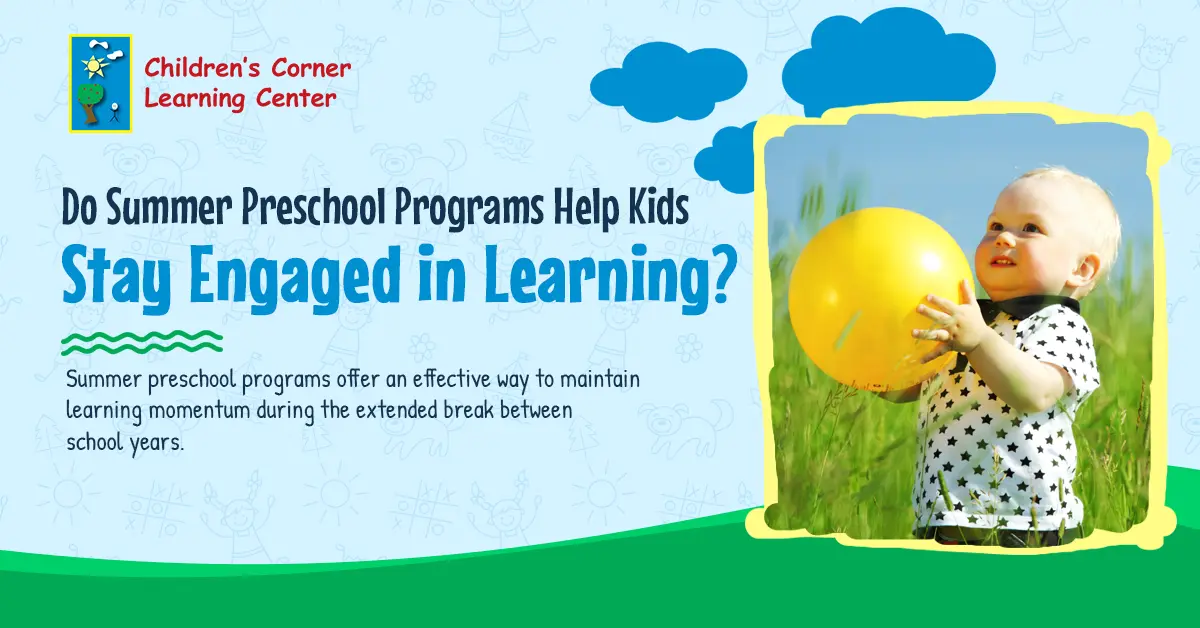
Summer preschool programs offer an effective way tomaintain learning momentum during the extended break between school years. Without access to structured educational activities, young children can experience a decline in academic readiness and cognitive engagement. By participating in summer programs, children continue to build essential skills by balancing play-based learning and guided instruction, keeping their minds active and focused.
Preventing Summer Learning Loss
The early years are critical for developing language, math, and problem-solving skills. When learning is paused for several months, children may lose the progress they made during the school year. Summer preschool programs help preserve and reinforce those gains.
- Daily literacy practice: Encourages vocabulary retention and phonemic awareness.
- Hands-on math activities: Reinforce counting, patterns, and number recognition.
- Storytime and discussion: Develops comprehension and listening skills.
- Art and creativity: Promotes expression while enhancing fine motor coordination.
- Science and nature play: Maintains curiosity through exploration and observation.
These activities ensure that learning remains consistent, reducing the need for significant review when the new school year begins.
Maintaining Cognitive Engagement Through Routine
Structured schedules provide children with a predictable routine that supports memory retention and learning stability. A consistent daily framework helps toddlers and preschoolers stay mentally engaged while promoting self-regulation and task completion.
- Morning circle time: Prepares children for group learning.
- Rotating learning centers: Expose children to varied subjects and tasks.
- Outdoor time: Encourages active learning and observation.
- Group projects: Foster collaboration and cognitive flexibility.
- Reflection time: Allows children to process and express their learning.
Attending a high-quality summer preschool program helps children remain actively engaged in meaningful learning experiences. This continuity supports both short-term progress and long-term academic success, giving children the tools they need to enter their next educational stage confidently.
Boosting Summer Learning for Preschoolers
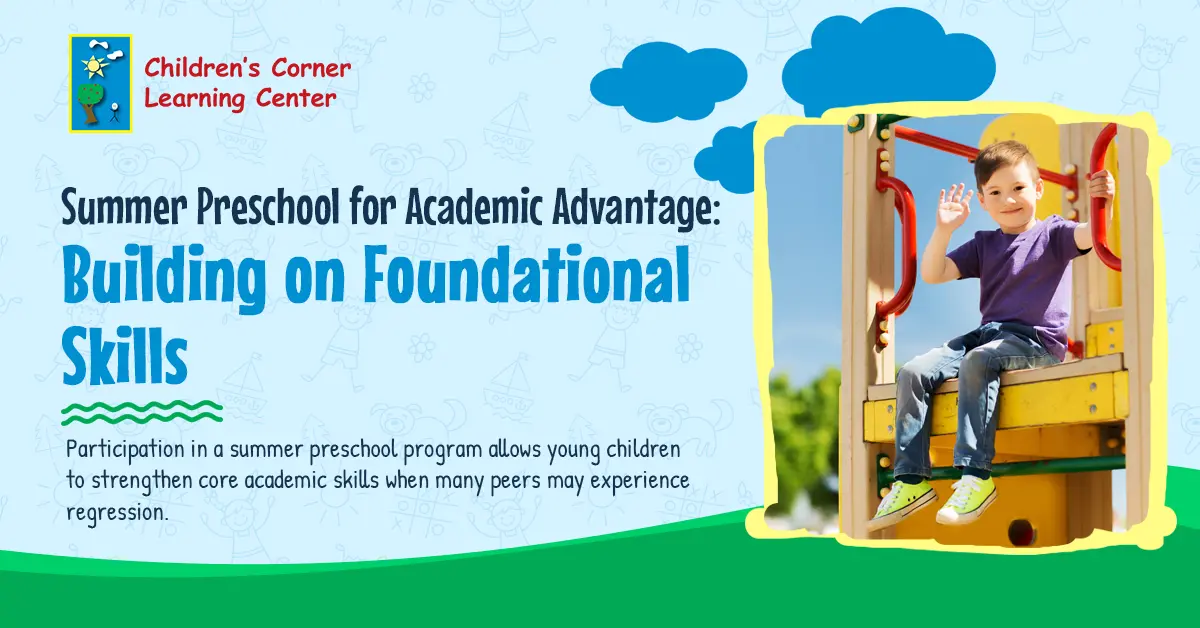
Participation in a summer preschool program allows young children tostrengthen core academic skills when many peers may experience regression. A structured summer environment promotes readiness for the upcoming school year by reinforcing the foundational areas of literacy, numeracy, and early reasoning. Children gain confidence and maintain the momentum needed for continued academic success when these essential skills are consistently nurtured.
Reinforcing Early Literacy and Language Skills
Summer programs often include daily reading, storytelling, and vocabulary-building activities that help children continue developing strong language skills. These exercises support communication, comprehension, and expression.
- Letter recognition games: Improve familiarity with the alphabet.
- Read-aloud sessions: Build listening skills and vocabulary.
- Story sequencing: Encourages understanding of narrative structure.
- Name writing practice: Strengthens letter formation and identity awareness.
- Rhyming and phonics: Lays groundwork for early reading skills.
Continued language exposure in a summer setting prevents stagnation and promotes progress in communication abilities.
Promoting Early Math Understanding
Numeracy development in early childhood includes recognizing numbers, understanding patterns, and developing problem-solving strategies. A summer preschool program allows children to revisit and build on these concepts through interactive, play-based activities.
- Counting objects: Reinforces one-to-one correspondence.
- Sorting and categorizing: Builds classification skills.
- Pattern recognition: Develops logical thinking.
- Simple measuring tasks: Introduce comparison and estimation.
- Number tracing: Enhances number identification and fine motor skills.
These skills are critical for academic success in kindergarten and beyond.
Strengthening Learning Habits and Focus
In addition to academic content, summer preschool supports the development of learning behaviors that contribute to classroom success. These habits help children adapt to group learning and classroom expectations.
- Following multi-step directions: Builds attention span.
- Staying on task: Encourages persistence and self-control.
- Participating in group discussions: Promotes verbal expression and active listening.
- Using classroom tools appropriately: Fosters responsibility and independence.
- Completing learning stations: Teaches time management and organization.
Summer preschool programs for academic advantage provide continuity in learning while preparing children for the demands of the upcoming school year. This early investment lays the foundation for academic confidence and long-term achievement.
Preschool Summer Programs for Child Development and Social Growth
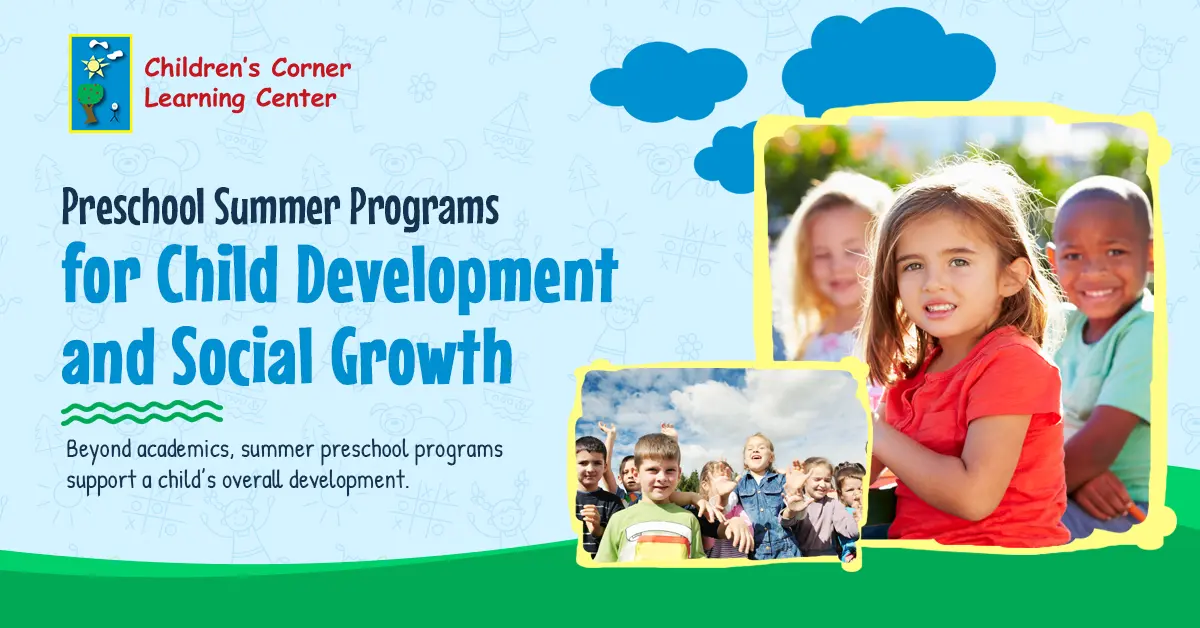
Beyond academics, summer preschool programs support a child’s overall development. These programs provide structured opportunities for children to strengthen emotional regulation, practice social interaction, and developessential life skills. Children build the confidence and independence needed for long-term growth and success through guided play, collaborative activities, and consistent routines.
Fostering Emotional Development Through Routine and Interaction
Emotional growth is supported when children feel secure and understood in a predictable environment. Summer programs offer structure while allowing flexibility for emotional expression and self-discovery.
- Consistent daily schedules: Help children feel safe and reduce anxiety.
- Small group settings: Provide space for emotional expression and trust-building.
- Teacher-guided conflict resolution: Teaches emotional control and empathy.
- Positive reinforcement: Encourages self-esteem and appropriate behavior.
- Mindfulness and calming exercises: Support self-regulation and focus.
These practices help children recognize and manage their feelings while responding to the emotions of others.
Developing Social Skills Through Peer Engagement
Summer preschool programs promote cooperative play and group participation, allowing children to build strong social foundations. These interactions teach young learners how to listen, take turns, and work together.
- Partner activities: Encourage sharing and cooperation.
- Group games: Build teamwork and collective problem-solving.
- Circle time discussions: Strengthen communication and respect for others.
- Creative projects: Inspire collaboration and joint decision-making.
- Outdoor play: Offers space for active, social exploration.
Regular social engagement allows children to form relationships and practice appropriate behavior in group settings.
Encouraging Independence and Confidence
As children navigate new environments and experiences, they begin to take initiative and build confidence in their abilities. Summer programs provide gentle support that encourages autonomy in daily tasks and interactions.
- Self-help routines: Promote responsibility in dressing, eating, and cleaning up.
- Choice-based centers: Foster decision-making and self-direction.
- Leadership roles: Boost confidence through assigned classroom tasks.
- Problem-solving challenges: Encourage resilience and adaptability.
- Celebrating achievements: Reinforces positive self-image and motivation.
Preschool summer programs for child development and social growth provide meaningful, guided experiences that nurture the whole child. These early learning opportunities establish strong emotional and social foundations that benefit children beyond the summer months.
Creating Consistency and Structure Over the Summer
Maintaining a routine during the summer months is essential for young children, especially those in the early stages of development. Without the structure provided by a preschool environment, children may experience learning, behavior, andemotional regulation disruptions. Summer preschool programs offer a dependable schedule that mirrors the rhythm of the academic year, helping children feel secure, stay engaged, and continue developing essential habits.
Supporting Behavioral Stability Through Routine
Young children thrive when expectations are clear, and schedules are predictable. A structured day helps toddlers and preschoolers anticipate what comes next, reducing anxiety and promoting cooperative behavior.
- Set arrival and dismissal times: Reinforce time awareness and responsibility.
- Consistent meal and nap schedules: Support physical and emotional regulation.
- Regular transitions: Help children move smoothly between activities.
- Daily routines for clean-up: Teach accountability and order.
- End-of-day reflections: Allow children to process their experiences.
Following a predictable schedule, children can better self-regulate and engage fully in their learning environment.
Promoting Continued Learning Habits
Maintaining learning routines during the summer prevents gaps in academic behavior and encourages a love for structured exploration. Children retain their ability to follow instructions, complete tasks, and focus on activities that build essential skills.
- Morning learning blocks: Establish time for academic reinforcement.
- Creative play sessions: Support imagination within a defined structure.
- Hands-on centers: Maintain focus through purposeful activity.
- Group instruction: Reinforce listening and participation.
- End-of-week themes: Provide consistency with variety and anticipation.
These habits prepare children to transition seamlessly back into the school year with minimal adjustment.
Building a Sense of Security and Confidence
Structure not only supports learning—it fosters emotional security. When children know what to expect, they feel more confident in their environment, which encourages independence and participation.
- Visual schedules: Help children track the day independently.
- Predictable routines: Build trust and emotional safety.
- Repetitive activities: Strengthen memory and comfort with tasks.
- Encouraging familiar rituals: Support a sense of belonging.
- Consistency in staff: Builds strong, trusting relationships.
Creating consistency and structure over the summer helps children maintain progress, feel secure, and return to school prepared and confident.
Conclusion
Summer preschool programs provide far more than seasonal childcare—they offer valuable learning experiences that support academic growth, social development, and emotional well-being. Through structured routines, engaging lessons, and collaborative play, children continue to thrive in a nurturing environment even when the traditional school year pauses. These programs help maintain consistency, strengthen essential skills, and gain the confidence needed for a successful transition into the next academic stage.
Explore how a summer preschool experience can benefit your child.Book a tour or call (800) 933 7757 to learn more about available programs and enrollment options.
